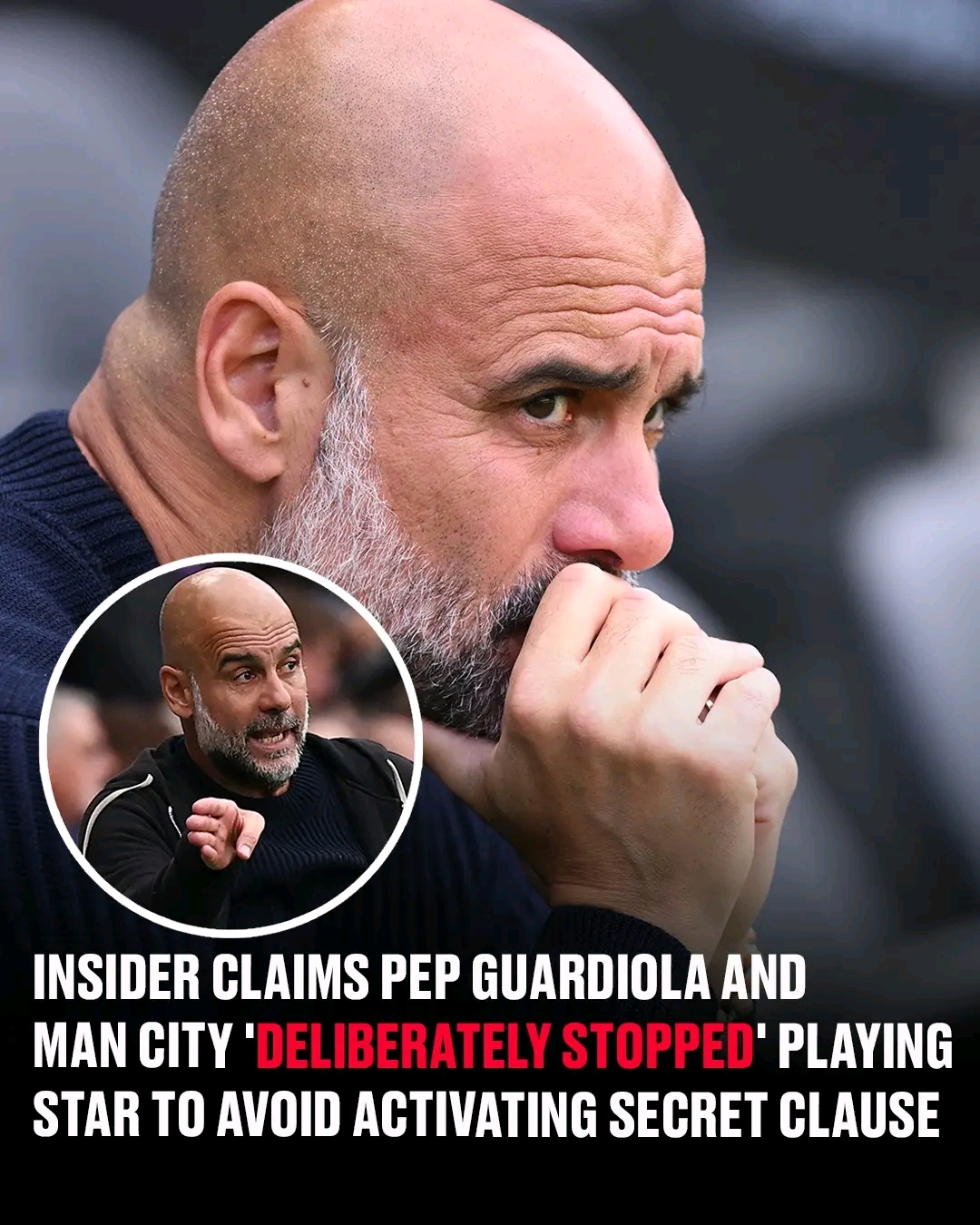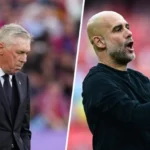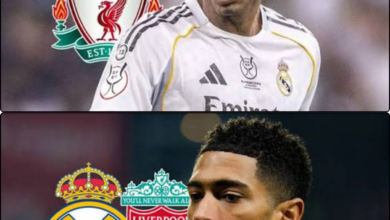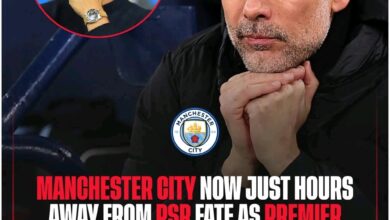Insider claims Pep Guardiola and Man City ‘deliberately stopped’ playing star to avoid activating secret clause

The world of modern football has evolved far beyond the simple dynamics of team selection based purely on merit and form. Today’s game operates within a complex web of financial regulations, contractual obligations, and strategic maneuvering that would make even the most seasoned business executives pause for thought. The recent allegations surrounding Manchester City’s handling of young defender Abdukodir Khusanov have thrown a spotlight on one of football’s most controversial practices: the strategic benching of players to avoid triggering expensive contractual clauses.
The story of Khusanov’s sudden disappearance from Manchester City’s matchday squads in the final months of the 2024-25 season represents more than just a simple case of squad rotation or tactical adjustments. According to insider reports from Uzbekistan journalist Mamadiyor Muxtarov, this was a calculated decision by Pep Guardiola and the City hierarchy to prevent the activation of a €5 million bonus clause that would have been triggered had the young defender reached ten appearances for the club.
This revelation, if accurate, opens up a fascinating window into the intersection of sporting and financial decision-making at the highest level of professional football. It raises questions about the priorities of modern clubs, the treatment of young players, and the increasingly complex nature of player contracts in an era where every decision carries significant financial implications.
To understand the context surrounding Khusanov’s situation, we must first examine Manchester City’s unprecedented January transfer window activity. The club, which had built its recent success on careful, strategic squad building, found itself in an unfamiliar position during the 2024-25 season. A horrific run of form that saw the defending champions struggle for consistency forced the club’s hierarchy to abandon their typically measured approach to the transfer market.
The January window became a statement of intent, with City committing an extraordinary £180 million to four new signings. This represented one of the most aggressive mid-season recruitment drives in the club’s history under the ownership of Sheikh Mansour. The desperation was palpable, and the financial outlay reflected the club’s determination to salvage what had threatened to become a disastrous campaign.
Among these high-profile acquisitions, Abdukodir Khusanov arrived from RC Lens for a fee of £33.8 million. At just 21 years old, the Uzbekistan international represented both an immediate solution to City’s defensive problems and a long-term investment in the club’s future. His signing was seen as a coup, given the interest from several other top European clubs and his impressive performances in Ligue 1.
The other major signings told their own stories of varying success. Omar Marmoush, the Egyptian forward, quickly established himself as a key player, scoring eight goals in 22 appearances and justifying his significant transfer fee through consistent performances. However, Nico Gonzalez, like Khusanov, found opportunities increasingly limited as the season progressed, suggesting that City’s January spending spree was more about covering all bases than implementing a clear, unified strategy.
The initial signs for Khusanov at Manchester City were decidedly mixed, but ultimately promising. His debut against Chelsea proved to be a baptism of fire, with the young defender struggling to adapt to the pace and intensity of Premier League football. The performance raised immediate questions about whether he was ready for such a significant step up in class, and critics were quick to suggest that City had been too hasty in their recruitment.
However, subsequent appearances told a different story. Khusanov began to demonstrate the qualities that had attracted City’s scouts in the first place. His pace, which Pep Guardiola would later praise as “special,” allowed him to recover from difficult situations and cover ground that other defenders simply couldn’t match. His reading of the game improved markedly with each appearance, and he began to show the kind of anticipation and positioning that suggested a player with genuine potential to develop into a top-class defender.
Perhaps more importantly, Khusanov displayed the kind of mental resilience that is essential for success at the highest level. Rather than being overwhelmed by his difficult debut, he used it as motivation to improve. His training ground performances were reportedly excellent, and his attitude impressed both coaching staff and teammates. He began to look like exactly the kind of long-term investment that Manchester City had intended when they committed such a significant fee to secure his services.
The defensive performances that followed his debut were characterized by increasing confidence and authority. Khusanov showed that he could handle the physical demands of English football while maintaining the technical quality that had made him such an attractive prospect. His distribution from the back was crisp and incisive, fitting perfectly with City’s possession-based style of play.
However, this upward trajectory came to an abrupt halt in March. Khusanov’s last appearance for Manchester City came in the FA Cup quarter-final victory over Bournemouth, where he was substituted at half-time. From that point forward, he was conspicuously absent from not just the starting eleven, but from matchday squads entirely. The sudden nature of this exclusion raised eyebrows among observers, particularly given that his previous performances had suggested he was becoming an integral part of Guardiola’s plans.
The alleged reason for Khusanov’s exclusion from City’s squads centers around the increasingly complex nature of modern football contracts. These agreements have evolved far beyond simple wage structures and basic performance bonuses to include intricate clauses that can have significant financial implications for clubs. The reported €5 million clause that would have been triggered by Khusanov’s tenth appearance represents just one example of how these contractual details can influence sporting decisions.
Such appearance-based clauses have become commonplace in modern football transfers, serving multiple purposes for both buying and selling clubs. For the selling club, they represent a way to ensure additional revenue if a player proves successful at their new destination. For the buying club, they can be seen as a form of insurance, ensuring that they only pay additional fees for players who actually contribute to the team.
The specific structure of Khusanov’s alleged clause – triggered at ten appearances rather than a higher threshold – suggests that RC Lens were confident in their player’s ability to establish himself quickly at Manchester City. This relatively low trigger point would have made it almost inevitable that the clause would be activated under normal circumstances, representing what could be seen as a clever piece of negotiation by the French club.
From City’s perspective, the decision to potentially avoid triggering this clause raises questions about their long-term planning and priorities. While €5 million represents a relatively small sum for a club of City’s financial resources, the principle of avoiding unnecessary expenditure is clearly important to their operations. However, this financial consideration must be weighed against the potential sporting benefits of continuing to develop a promising young player.
The situation becomes even more complex when considering the broader context of Financial Fair Play regulations and the scrutiny that Manchester City faces regarding their spending. Every financial decision made by the club is analyzed not just in terms of its immediate impact, but also its implications for the club’s overall financial health and compliance with various regulatory frameworks.
The alleged strategic benching of Khusanov is far from unprecedented in modern football. The most famous recent example involves Antoine Griezmann during his loan spell at Atletico Madrid from Barcelona. In that case, Atletico deliberately limited Griezmann’s playing time to avoid triggering a clause that would have required them to purchase the player permanently for a significant fee.
The Griezmann situation became a source of considerable controversy, with critics arguing that such tactics undermined the sporting integrity of the game. Fans and pundits questioned whether clubs should be allowed to prioritize financial considerations over sporting merit when making team selection decisions. The debate highlighted the tension between the business and sporting aspects of modern football.
Other examples of similar practices have emerged over the years, though few have received the same level of public attention as the Griezmann case. These situations typically involve loan agreements with complex clauses, but they can also apply to permanent transfers with appearance-based bonuses, as appears to be the case with Khusanov.
The prevalence of such practices suggests that they are viewed as legitimate business strategies within the football industry, even if they may seem ethically questionable to outside observers. Clubs argue that they have a responsibility to their shareholders and supporters to manage their finances responsibly, and that includes avoiding unnecessary expenditure where possible.
However, these precedents also demonstrate the potential risks associated with such strategies. The negative publicity generated by high-profile cases can damage a club’s reputation, particularly if it is perceived as treating players unfairly or prioritizing money over sporting success.
Pep Guardiola’s public comments about Khusanov provide an interesting counterpoint to the allegations about the player’s exclusion from squads. In March, before the defender’s mysterious disappearance from matchday squads, Guardiola was effusive in his praise for the young Uzbek international.
“He [Khusanov] was not expected to play this many games but the situation in the back four all season means he plays a lot of games,” Guardiola explained in a press conference. This comment is particularly significant in light of the subsequent allegations, as it suggests that Khusanov’s playing time had already exceeded expectations at that point.
Guardiola went on to highlight specific qualities that had impressed him: “He has a special quality. Really special. He’s so fast and he brings his passion. His face doesn’t always show but he shows it in many actions. We are delighted in the short time with training, with many things.”
These comments paint the picture of a manager who was genuinely impressed with his new signing’s development and contribution to the team. The praise for Khusanov’s speed, passion, and training ground attitude suggests that his exclusion from later squads was not based on any decline in performance or attitude.
The apparent contradiction between Guardiola’s public praise and the subsequent team selection decisions raises questions about the extent to which financial considerations influenced sporting choices. If the allegations are accurate, it would suggest that even a manager of Guardiola’s stature and influence can be constrained by financial considerations when making team selection decisions.
This situation also highlights the complex position that modern managers find themselves in. While they are primarily judged on sporting success, they must also operate within financial constraints and considerations that may not always align with their purely sporting instincts. The balance between these competing demands represents one of the most challenging aspects of management at the highest level of modern football
The alleged decision to bench Khusanov must be understood within the broader context of Manchester City’s ongoing battles with Financial Fair Play regulations and their determination to demonstrate financial responsibility. The club has faced intense scrutiny over their spending patterns and revenue generation, with various investigations and charges related to alleged rule breaches.
In this environment, every financial decision takes on added significance. What might previously have been seen as a minor contractual detail becomes magnified when viewed through the lens of regulatory compliance and public perception. The decision to potentially save €5 million may therefore represent more than simple cost-cutting – it could be part of a broader strategy to demonstrate financial prudence.
The timing of these alleged decisions is also significant. As the 2024-25 season drew to a close, clubs were preparing their financial statements and assessing their compliance with various regulatory requirements. Any unnecessary expenditure during this period could have implications for the club’s ability to meet Financial Fair Play thresholds and other regulatory benchmarks.
However, this financial caution must be balanced against the sporting implications of such decisions. Manchester City’s success has been built on their ability to identify and develop talented players, and any strategy that potentially hampers this development could have long-term sporting consequences.
The situation also raises questions about the sustainability of current transfer market practices. If clubs are regularly forced to make sporting decisions based on financial technicalities, it may suggest that the current system of complex contractual clauses and regulatory frameworks is not serving the best interests of the game.
The alleged treatment of Khusanov raises important questions about player development and the ethical responsibilities of football clubs toward their employees. At just 21 years old, Khusanov is at a crucial stage of his career where regular playing time and development opportunities are essential for his long-term prospects.
If the allegations are accurate, the decision to bench him to avoid a financial clause could have significant implications for his development as a player. Young defenders in particular benefit from regular game time and the opportunity to learn from their mistakes in competitive situations. The lack of appearances during the crucial final months of the season could therefore have a lasting impact on his career trajectory.
From an ethical standpoint, the situation raises questions about the balance between a club’s financial interests and their duty of care toward their players. While clubs have a right to manage their finances responsibly, this must be weighed against their obligation to provide opportunities for player development and career progression.
The psychological impact on the player must also be considered. Moving from being praised by the manager and making regular appearances to being excluded from squads entirely would be challenging for any player, but particularly for a young international adjusting to a new league and country.
These considerations extend beyond the individual case of Khusanov to broader questions about how young players are treated in modern football. The increasing financial pressures on clubs may be leading to situations where promising talents are sacrificed for short-term financial gains, potentially damaging the long-term health of the sport.
The revelation of Khusanov’s alleged situation highlights the important role that media coverage plays in exposing potentially questionable practices within football. The story was broken by Mamadiyor Muxtarov, a journalist from Uzbekistan with a significant social media following, demonstrating how modern sports journalism extends far beyond traditional media outlets.
The international nature of the coverage also reflects the global reach of modern football and the way that stories can quickly gain traction across different media markets. What began as a report from a Central Asian journalist quickly became a topic of discussion among football fans and analysts worldwide.
The public reaction to such stories is typically one of skepticism and concern about the direction of modern football. Fans often express frustration with what they perceive as the prioritization of financial considerations over sporting merit, and such stories can contribute to a broader sense of disconnection between clubs and their supporters.
However, the media coverage also serves an important function in holding clubs accountable for their decisions and practices. Without such scrutiny, potentially problematic practices might continue unchecked, and the transparency provided by media coverage helps to ensure that clubs must justify their actions to their stakeholders.
The social media aspect of modern sports journalism also means that stories can develop and evolve rapidly, with new information and perspectives being added in real-time. This can help to provide a more complete picture of complex situations, but it can also lead to speculation and misinformation if not properly managed.
The Khusanov situation, regardless of its ultimate resolution, provides important lessons for Manchester City and other clubs about the structure of future transfer deals and contract negotiations. The alleged presence of a relatively low-threshold appearance clause suggests that more careful attention needs to be paid to the long-term implications of contractual details.
For City, the situation may lead to a reassessment of how such clauses are negotiated and structured in future deals. Rather than accepting relatively low thresholds that can create difficult situations, the club may push for higher thresholds or alternative structures that better align financial and sporting incentives.
The broader football community may also need to consider whether current practices around complex contractual clauses are serving the best interests of the sport. If such clauses regularly lead to situations where sporting decisions are compromised by financial considerations, there may be a case for simplifying contract structures or introducing regulations to prevent such conflicts.
From a player development perspective, the situation highlights the importance of ensuring that young players have clear pathways to regular playing time and development opportunities. Clubs may need to be more transparent about the factors that influence team selection decisions, particularly when financial considerations are involved.
The situation also raises questions about the role of agents and advisors in negotiating contracts that protect players’ interests while also meeting clubs’ commercial requirements. Better representation and advice during contract negotiations could help to prevent situations where players find themselves caught between sporting and financial considerations.
The allegations surrounding Abdukodir Khusanov’s treatment at Manchester City provide a fascinating case study in the complex realities of modern football. The story illustrates how financial considerations can influence sporting decisions in ways that would have been unthinkable in earlier eras of the game.
Whether or not the specific allegations prove to be accurate, the situation highlights important questions about the balance between commercial and sporting considerations in contemporary football. The increasing complexity of player contracts and the financial pressures facing even the wealthiest clubs are creating situations where traditional sporting logic may be compromised by business realities.
For Manchester City, the situation represents both a challenge and an opportunity. If handled poorly, it could damage the club’s reputation and relationships with players and agents. However, if addressed transparently and constructively, it could provide valuable lessons for future transfer and contract negotiations.
The broader football community must also grapple with the implications of such practices. As the sport continues to evolve and commercialize, maintaining the balance between business success and sporting integrity becomes increasingly challenging. The Khusanov case serves as a reminder that every decision in modern football carries multiple implications that extend far beyond the immediate sporting context.
Ultimately, the story of Khusanov’s alleged benching reflects the complex, sometimes uncomfortable reality of modern football. It is a world where sporting dreams and financial realities intersect in ways that can create difficult ethical and practical dilemmas. How clubs, players, and the broader football community navigate these challenges will help to determine the future direction and character of the sport.
The young Uzbek defender’s situation may ultimately be resolved in his favor, with increased playing time and development opportunities in the future. However, the questions raised by his alleged treatment will likely continue to resonate as football grapples with the ongoing tension between its sporting heart and commercial reality. In this complex landscape, transparency, ethical consideration, and a commitment to both sporting excellence and player welfare remain essential guides for navigating the challenges ahead.















